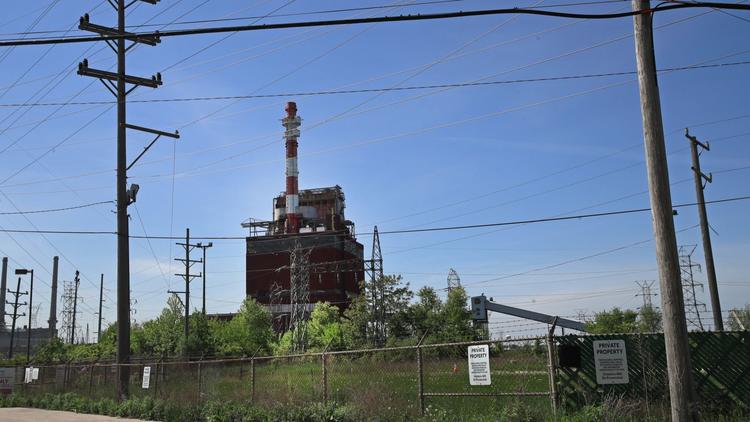Despite President Donald Trump’s pledge to bring back the days when coal power dominated the nation, his administration quietly settled a lawsuit this month that highlights how the lung-damaging, climate-changing source of electricity has largely disappeared from the Chicago area.
Six coal-fired power plants at issue in the nearly decade-old case have been shut down, cleaned up or converted to burn natural gas — dramatically improving air quality without affecting residential electric bills or the stability of the regional power grid.
All that remained was a federal lawsuit accusing former plant owners of evading clean air laws for years. The case lingered in federal courts until the current operator, New Jersey-based NRG, tentatively agreed this year to pay fines of $500,000 each to the U.S. Environmental Protection Agency and the state of Illinois.
The legal settlement, made official on May 10, adds the weight of a federal court order to ensure the shuttered coal plants stay closed and pollution-control equipment installed at the others is kept in place.
As the Trump administration rolls back environmental regulations and attempts to resurrect the coal industry, the NRG settlement is a reminder of economic, legal and political forces that began shifting the country away from the fossil fuel well before the president and his EPA administrator, Scott Pruitt, took office.
It also is a remarkable victory for a small group of Will County watchdogs and their attorney from a nonprofit legal aid clinic, who kept the case alive after regional and national environmental organizations backed out as part of a separate settlement.
“People thought, or maybe they hoped, we would just go away,” said Ellen Meeks Rendulich, one of the organizers of a grass-roots group dubbed Citizens Against Ruining the Environment. “We didn’t get 100 percent of what we wanted, but what’s coming out of those smokestacks now is nothing compared to what it used to be like.”
Normally a settlement of this magnitude would be trumpeted in news releases from the EPA and the Department of Justice. In this case, neither agency announced the resolution of an enforcement action initiated by the Obama administration, even though changes outlined in the government’s agreement with NRG have already had significant effects.
Emissions of sulfur dioxide and nitrogen oxide — pollution that forms smog, soot and acid rain — dropped by about 90 percent at the power plants between 2009 and 2017, according to a Tribune review of federal records. The amount of heat-trapping carbon dioxide released into the atmosphere by the fleet declined by about 75 percent during the period — equivalent to taking 5.5 million cars off the roads.
When combined with other coal-plant shutdowns in the state, the overhaul put Illinois on a fast track to meet targets in the EPA’s Clean Power Plan, an Obama initiative to reduce climate change pollution that the Trump administration and coal companies are attempting to overturn.
The settlement with NRG “is really a capstone to a long fight for environmental justice,” said Keith Harley, the Chicago Legal Clinic attorney who represented the Will County group. Power companies warned that closing coal-fired plants would disrupt the smooth delivery of electricity, Harley said, but none of their ominous predictions came true.
“The lights are still on,” he said. “We still have a glut of electricity.”
Built by ComEd between the early 1900s and the 1960s, the coal plants were among dozens nationwide that started generating electricity before Congress passed the 1970 Clean Air Act. For years the plants were exempted from the toughest provisions of the law because utilities vowed they wouldn’t be running much longer.
A company called Midwest Generation bought the ComEd plants in 1999 and kept them running as a growing number of scientific studies found that coal plant pollution triggers asthma attacks, causes heart disease and shaves years off of lives. Unlike newer power plants, the ComEd/Midwest Generation facilities were not equipped with advanced pollution controls that sharply reduce lung-damaging soot and other harmful air pollution.
In 2010, a year after the EPA and Illinois Attorney General Lisa Madigan sued Midwest Generation, the National Research Council, the government’s main scientific advisory body, estimated that pollution from one of the company’s coal plants in Romeoville had cost surrounding areas $187 million a year in hidden health costs.
Groups clamoring for Midwest Generation to either clean up or shut down its fleet were particularly concerned about two Chicago plants — Crawford in Little Village and Fisk in Pilsen — that were estimated to cost the low-income, predominantly Latino neighborhoods $127 million a year in health damages. Activists held prayer vigils, performed street theater and organized throngs of protesters who urged city, state and federal authorities to take more aggressive action.
The tipping point came when the regional energy market began squeezing out aging, inefficient coal plants in favor of cleaner-burning natural gas that had become cheaper to produce than coal.
By the time Midwest Generation’s parent company declared bankruptcy in 2013, the two Chicago plants had been scuttled as part of a deal with Mayor Rahm Emanuel. Plans were in the works to meet state pollution standards by shutting down or upgrading generating units at the others.
NRG acquired the fleet the following year, converted the massive Joliet plant to natural gas and scrapped the dirtiest units at plants in Romeoville and Waukegan. The company also installed pollution controls at the Powerton plant near downstate Pekin and the remaining coal-fired generators at Romeoville and Waukegan.
“NRG invested more than $500 million to modernize and add environmental controls to our Illinois fleet, keeping a promise we made when we acquired Midwest Generation,” David Gaier, a company spokesman, said in an email.
It is unclear how much longer the last coal unit at Romeoville and the two remaining at Waukegan will continue to operate. The Romeoville plant didn’t generate electricity between May and January, according to federal records.
Natural gas now produces more electricity in the U.S. than coal, which as recently as a decade ago was responsible for more than half of the nation’s energy. Rapidly declining prices for wind and solar power, energy efficiency initiatives and state renewable energy mandates are projected to cut even deeper into coal’s shrinking share of the energy mix.
The shifting economics are a major reason why nearly 270 U.S. coal plants have either closed or been scheduled for retirement during the past eight years, according to a tally by the Sierra Club, a nonprofit advocacy group that turned up the pressure on power companies with a series of Clean Air Act lawsuits.
At least a dozen plant closures are planned this year alone.
An Indiana power company is planning to shut down a Chesterton coal plant for good next week. Another former ComEd coal plant on the Chicago-Hammond border was leveled four years ago.
Wisconsin’s largest utility, We Energies, is building a solar farm to replace most of the electricity that was generated by the Pleasant Prairie plant, a coal burner that closed last month just north of the Illinois border.
The number of coal plants in downstate Illinois is also dwindling. Texas-based Vistra Energy Corp. has signaled that the eight financially struggling plants the company recently acquired in Illinois could be shut down.
“I don’t believe (coal) is going to have a renaissance,” Curtis Morgan, Vistra’s chief executive, told CNBC in April. “I think it’s on its way out.”
At the same time, Vistra and Gov. Bruce Rauner’s administration are pushing a change in state regulations that would make it easier for the company keep its dirtiest units running.
The coal magnate Robert Murray has gone a step further, urging Trump to bail out coal plants by invoking a 1920 law intended ensure the U.S. has enough electricity available during wars or other national emergencies. Others want Trump to effectively nationalizethe industry.
“That’s like requiring everybody to use AT&T landline phones or Kodak film cameras,” said Howard Learner, president of the Chicago-based Environmental Law and Policy Center. “The world is changing. The bottom line is coal plants are outdated technology that increasingly can’t compete in the modern power market.”
Twitter: @scribeguy







